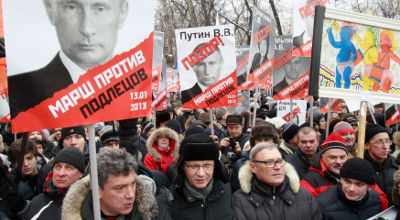Russians Protest Ban on Adoptions by Americans
Thousands of demonstrators gathered for a march in Moscow on Sunday to protest against a ban on Americans adopting Russian children, saying President Vladimir Putin’s governmenthad made orphans pawns in a political dispute.
Kremlin critics and other opponents of the ban converged on a central boulevard in freezing temperatures, some chanting “Shame!” and “Putin is a scoundrel!” or holding banners condemning lawmakers who backed the law prohibiting adoptions.
The ban has deepened a chill in Russian-American relations in the first year of Putin’s new term and compounded the bitterness between his government and opponents who have been mounting street protests for over a year.
The ban, which took effect on January 1, was rushed through parliament in retaliation for the Magnitsky Act–U.S. legislation that denies visas to Russians accused of human rights violations and freezes their assets in the United States.
Critics say the ban punishes Russian children instead of the U.S. government, decreasing their chances of getting out of a system of state homes plagued by overcrowding.
“Without adoption such children have no chance,” said Dmitry Belkov, an organizer who said his wife’s friend had adopted a child who had been taken away from his jailed mother.
“Watching her life, we can see that this law is a worse thing to do to those children than the treatment animals get in other countries.”
Russian lawmakers have said the adoption ban was justified by the deaths of 19 Russian-born children adopted by American parents in the past decade, and what they perceive as lenient treatment of those parents by U.S. courts and police.
The law is named after Dima Yakovlev, a boy who died after his adoptive American father left him locked in a sweltering car, but Kremlin critics call it the “scoundrels’ law.
Petition for Repeal
Protesters held banners saying “against the scoundrels’ law” and signs with photographs of some of the pro-Kremlin lawmakers who backed the bill, bearing captions such as “Shame!”
Organizers gathered signatures on a petition calling for the law’s repeal, saying it was in violation of Russia’s international obligations and took the private lives of individuals hostage to a political dispute between countries.
The protest march, which was permitted by authorities, followed the same route Kremlin opponents have trod in some of the demonstrations they have held since Putin’s party won December 2011 parliamentary election marred by fraud claims.
The route was fenced off by metal barriers manned at intervals by police.
Kremlin foes hope the adoption ban will help breathe new life into the protest movement, which has lost strength after failing to prevent Putin’s election to a six-year presidential term last March.
The ruling United Russia party, which submitted the law and which Putin uses as a source of support, has retaliated by branding opponents of the ban as unpatriotic.
Americans have adopted more than 60,000 Russian children since the 1991 Soviet breakup, more than parents from any other nation, and the ban has dashed the hopes of hundreds of couples who were in the midst of the process when it took effect.
The issue has always been a sensitive one for Russians, particularly in government, playing into a rivalry that reaches back to the Cold War and a sense of humiliation at the idea that Russia might be unable to care for its own children.
When Putin signed the law on December 28, he also issued a decree aiming to improve conditions for orphaned children, and his ally, the head of the Russian Orthodox Church, urged Russians to adopt in a Christmas message.
Writing by Steve Gutterman; Editing by Myra MacDonald
© 2013 Thomson Reuters. All rights reserved.














































